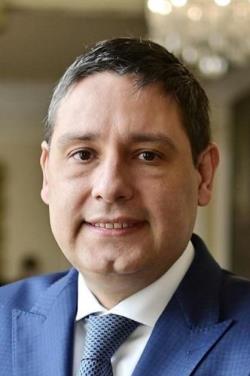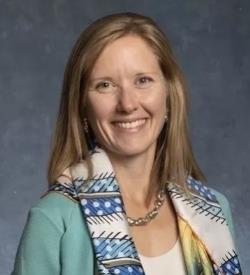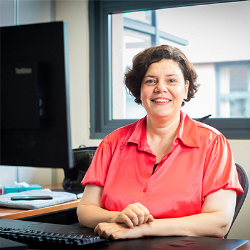Navigating the Double-Edged Sword: ICT’s and AI’s Impact on Climate Change and Environmental Sustainability
International Telecommunication Union (ITU)
Session 368
Green Digital Action
This session takes a comprehensive look at the Information and Communication Technology (ICT) sector's impact on environmental sustainability, with a special emphasis on the role of Artificial Intelligence (AI). As the ICT sector continues to expand, encompassing everything from data centers, networks, consumer devices to the burgeoning field of AI, its environmental footprint becomes increasingly significant. This discussion aims to unravel the complex relationship between the growth of digital technologies and the sustainability of our planet.
While the ICT sector offers unparalleled opportunities for advancing sustainability — such as through the optimization of energy systems, smart grids, enhanced efficiency across industries, or valuable insights into climate change patterns — it also poses substantial environmental challenges. Increased digital adoption escalates energy and water consumption, greenhouse gas (GHG) emissions, material usage, e-waste, and demand for critical raw materials.
The session will delve deeper into AI's specific impact within this broader context, examining how AI's computational demands contribute to the sector's energy use and GHG emissions. As AI systems, particularly in areas like generative AI and machine learning, become more sophisticated, their energy requirements surge, exacerbating the sector's environmental footprint. AI's reliance on data centers and network infrastructure is growing, further intensifying its environmental impact. The construction and operation of data centers require substantial energy, often sourced from non-renewable sources, and contribute significantly to GHG emissions. Additionally, the high energy consumption of AI systems results in increased water usage, as cooling systems in data centers require vast amounts of water. Therefore, it is crucial to address the environmental implications of AI's energy and water usage to ensure sustainable development in this field.
This session will provide a balanced perspective, recognizing both the potential and the pitfalls of ICTs in the context of environmental sustainability, discussing current research, and spotlighting the role of international standards, policy and global collaboration in steering the ICT sector, and AI in particular, towards a more sustainable future.
This session is designed for a wide audience, including policymakers, industry leaders, environmental advocates, researchers, and technologists. It is particularly relevant for those interested in seeking pathways to mitigate negative environmental impacts of digital technologies and to achieve the ICT sector's commitment to reduce emissions based on 1.5 degree aligned science-based targets as demonstrated through the commitments of Green Digital Action partners at COP28.

He was born on August 12, 1976 in Medellín. He is a lawyer from the Universidad del Rosario, with a specialization in Management, Government and Public Affairs from the Universidad Externado de Colombia in association with Columbia University, he holds a Master of Public Policy in MPA from Harvard University and a Master of Business Administration and an academic researcher graduated from the Massachusetts Institute of Technology (M.I.A). He has 23 years of experience holding management positions in different regional and national entities.
In August 2022 he was designated by President Gustavo Petro, as Director of the Administrative Department of the Presidency of the Republic (Dapre) until April 2023; He served as Secretary General of the Agustín Codazzi Geographic Institute, between 2004 and 2005.
He worked as an office advisor to the Ministry of Technologies and Communications in 2003 and a consultant for UNDP and the Ministries of the Interior and Justice in the same year.
In 2002 he was Secretary of Transit of Manizales; in 2001 Territorial Director Bogotá and Cundinamarca of the National Administrative Department of the Solidarity Economy DANSOCIAL and in 2000, National Vice President AIESEC Colombia.
He has also served as a professor of the Political Science program at the Autonomous University of Manizales.
In his political career, he was elected Senator of the Republic between July 20, 2010 and July 19, 2018, he assumed as president of that corporation between 2016 and 2017; He was also elected Representative to the Chamber for Caldas in the period 2006-2010.

Antonia is Global Director of Sustainability & Partnerships, where she works with teams across Google and with external partners to progress company-wide sustainability & climate goals with a focus on Climate & AI; Net Zero and scaling sustainability product solutions. Building partnerships is at the core of her work, recognizing that Google can only successfully achieve its goals in collaboration with governments, NGOs, think tanks and experts to jointly unlock the system-wide transformations required.
In her 20 years of experience driving system change, she has worked globally with a range of leading international institutions include as Head of Climate Change and Deputy Director of the WEF Centre for Nature and Climate; Senior Analyst with the International Energy Agency; and Deputy Director of Energy and Climate at the World Business Council for Sustainable Development. She also spent two years working in Bhutan and across the region as an adviser on environment and clean energy.
She holds a Master’s in Environmental Planning, Policy and Regulation from the London School of Economics and a BA in Environmental Economics from the University of Toronto. In 2005, she was nominated by the International Institute for Sustainable Development as a Young Global Leader for Sustainable Development.

Jean Manuel Canet is a Senior Manager in charge of Climate and Biodiversity in the CSR Department of Orange Group. He has developed an expertise in the assessment of the environmental impact of ICT goods, services and organizations. He earlier led numerous projects to assess and reduce GHG emissions related to IT, for customers such as the European Parliament, France Télévisions or Zurich Financial Services. He serves as Vice-Chairman of ITU-T SG5 and Co-Rapporteur of the “Climate change and assessment of digital technologies in the framework of the SDGs and the Paris Agreement” question. He served as a member of the Advisory Panel of the UNFCCC “Momentum for Change” initiative. Jean-Manuel graduated from Télécom ParisTech and the MBA Programme of the “Collège des Ingénieurs”. He holds a certificate in carbon accountancy from the French National Agency for Energy and Environment and a certificate in carbon finance from Carbone 4 Academy.

Golestan (Sally) Radwan (B.Sc., MBA, M.Sc.) is a Computer Scientist with expertise in AI and emerging technologies. Prior to UNEP, Sally served as Advisor to the Egyptian Minister of ICT, where she led the development and implementation of Egypt’s national AI strategy. During this time, she served as an expert and delegate of Egypt to several international organizations working on AI Policy and Regulation including UNESCO, WIPO, ITU, and OECD. She also championed and led two working groups within the African Union and League of Arab States to unify regional efforts around Responsible AI. Sally previously held several executive positions in the technology industry over 17 years, working in Germany, Austria, the UK and the US for companies including Novell GmbH, Avaya Inc. and NTT Data Europe. She earned a B.Sc. in Computer Engineering from Cairo University and an MBA from London Business School, as well as an MSc in Clinical Engineering and Healthcare Technology Management from City University of London. She is currently finalizing her PhD thesis, focusing on AI explainability and its ethical considerations in metagenomics at the Royal Holloway University of London.

Coordinating the climate and environmental sustainability agenda of the International Telecommunication Union, Robin orchestrates private-public partnerships, galvanizing the digital tech community to drive intensified climate action. Previously, she led the organization’s internal environmental sustainability journey. Prior to joining ITU, Robin’s role as a project manager at a business network for corporate social responsibility, as well as her engagement with emerging social tech entrepreneurs, ignited her passion for innovative business models and multi-stakeholder collaboration to drive positive change. She holds a master's degree in international business with a focus on corporate social responsibility from the University of St Andrews.
-
 C7. ICT applications: benefits in all aspects of life — E-environment
C7. ICT applications: benefits in all aspects of life — E-environment
-
 C11. International and regional cooperation
C11. International and regional cooperation
-
 Goal 12: Ensure sustainable consumption and production patterns
Goal 12: Ensure sustainable consumption and production patterns
-
 Goal 13: Take urgent action to combat climate change and its impacts
Goal 13: Take urgent action to combat climate change and its impacts
-
 Goal 15: Sustainably manage forests, combat desertification, halt and reverse land degradation, halt biodiversity loss
Goal 15: Sustainably manage forests, combat desertification, halt and reverse land degradation, halt biodiversity loss
-
 Goal 17: Revitalize the global partnership for sustainable development
Goal 17: Revitalize the global partnership for sustainable development